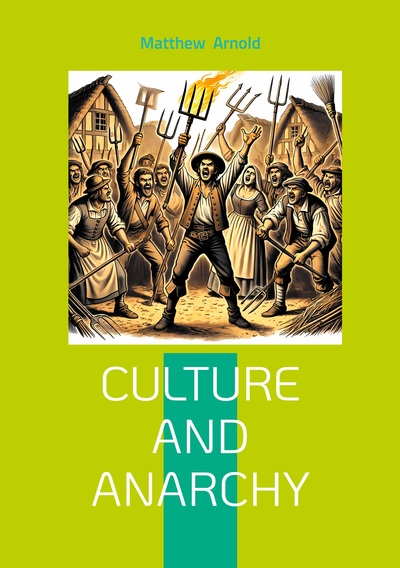Nous utilisons des cookies pour améliorer votre expérience. Pour nous conformer à la nouvelle directive sur la vie privée, nous devons demander votre consentement à l’utilisation de ces cookies. En savoir plus.
Culture and Anarchy
Books On Demand - EAN : 9782322578368
Édition papier
EAN : 9782322578368
Paru le : 11 juin 2025
19,90 €
18,86 €
Disponible
Pour connaître votre prix et commander, identifiez-vous
Notre engagement qualité
-
 Livraison gratuite
Livraison gratuite
en France sans minimum
de commande -
 Manquants maintenus
Manquants maintenus
en commande
automatiquement -
 Un interlocuteur
Un interlocuteur
unique pour toutes
vos commandes -
 Toutes les licences
Toutes les licences
numériques du marché
au tarif éditeur -
 Assistance téléphonique
Assistance téléphonique
personalisée sur le
numérique -
 Service client
Service client
Du Lundi au vendredi
de 9h à 18h
- EAN13 : 9782322578368
- Réf. éditeur : 404919
- Editeur : Books On Demand
- Date Parution : 11 juin 2025
- Disponibilite : Disponible
- Barème de remise : NS
- Nombre de pages : 230
- Format : H:210 mm L:148 mm E:16 mm
- Poids : 340gr
- Résumé : Culture and Anarchy, first published in 1869, is a landmark work of Victorian literature and social criticism by Matthew Arnold. In this influential text, Arnold examines the deep tensions within English society, particularly the conflict between culture and anarchy. He argues that culture defined as the pursuit of perfection and the harmonious development of human faculties offers the best remedy for the social unrest and moral confusion of his age. Arnold identifies three broad classes in English society: the aristocracy (Barbarians), the middle class (Philistines), and the working class (Populace). He criticizes each for its narrowness and lack of true culture, suggesting that only a disinterested pursuit of beauty and intelligence can elevate individuals and society as a whole. The book is celebrated for its incisive analysis, its eloquent prose, and its call for a more humane and enlightened approach to education and governance. Throughout the text, Arnold explores the dangers of unchecked individualism and the need for a shared framework of values. He warns against the excesses of both traditionalism and radicalism, advocating instead for the transformative power of culture. His arguments are illustrated with references to contemporary events, literary examples, and philosophical ideas, making the work both timely and timeless. Readers who enjoy classic literature will appreciate the richness of Arnolds thought and the clarity of his expression. Those interested in philosophy and social criticism will find his analysis of English society both challenging and illuminating. The book also appeals to fans of Victorian literature, as it captures the intellectual debates and anxieties of the era.
- Biographie : Matthew Arnold, born in 1822, was a prominent English poet, critic, and social thinker whose works have left a lasting impact on literature and intellectual history. The son of Thomas Arnold, the influential headmaster of Rugby School, Matthew was educated at Rugby and later at Balliol College, Oxford, where he began his lifelong engagement with the ideas and ideals that would shape his writing. Arnolds career as a poet established his reputation for lyrical beauty and philosophical depth. His most famous poems, such as « Dover Beach, » reflect his concerns about faith, doubt, and the challenges of modern life. However, it is as a critic and social commentator that Arnold achieved his greatest influence. Culture and Anarchy, his best-known prose work, remains a foundational text in the study of culture and society. Arnold served as an inspector of schools for much of his life, a role that informed his views on education and the importance of culture in public life. He argued passionately for the value of literature and the arts as means of personal and social improvement. His ideas about culture as the pursuit of sweetness and light, as well as his critique of dogmatism and narrowness, continue to resonate in debates about education, politics, and the role of the humanities. Arnolds legacy is that of a visionary thinker who sought to bridge the gap between tradition and modernity. His works are widely read by those interested in Victorian literature, philosophy, and social criticism. He died in 1888, but his influence endures in the ongoing conversation about the meaning and value of culture in a rapidly changing world.



